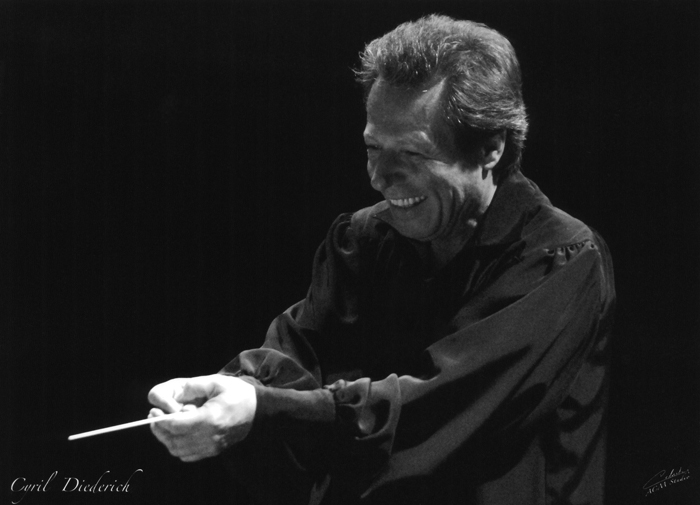
Cyril DIEDERICH
A BIOGRAPHY, by Alain Duault

Cyril Diederich, born into a family of musicians (his father was the composer and conductor Raymond Diederich), has been immersed in music since early childhood; at age five, he began to learn the piano. In particular, he was immersed in the fascinating universe of opera, for which he developed a life-long passion. He was born in Aix-en-Provence and, thanks to his father, spent his summers at the newly created Aix Festival which, during the mid 1950s and early 1960s, was in full effervescence.
The combination of the family atmosphere and the annual summer event moulded the inner world of the young Cyril Diederich and nurtured his desire to become a musician.
He followed up the early piano studies and expanded his horizon to include the French horn, graduating in 1968 with honours from the Conservatoire National Supérieur de Musique of Paris, where he had been the student of Jean Devemy, and worked too with the great Georges Barboteu.
But as soon as he began attending concerts at the Aix Festival, he was drawn towards the musical figure who seemed to hold the whole of the orchestra in his hand and, very early on, decided to study the art of conducting. His teachers were Louis Fourestier, as that time conductor of the Paris Opera, and Jean-Sébastien Berreau.
During these years he played solo Horn in the advanced orchestra of the CNSM of Paris and became a passionate student of Manuel Rosenthal, his conducting teacher and mentor. Following his years at the conservatory, Cyril Diederich won many international prizes, notably the Concours International of Florence, and the competition of Kowice in Polland (special prize of the jury).
In 1970, he created a chamber orchestra with several musician friends, and organized a festival in Provence, the Semaines musicales du Luberon :
this was the real beginning of his career, and also his first appearance as an operatic conductor - in neighbouring festivals like those of Carpentras and Vaison-la-Romaine.
In 1974, he became the assistant to Serge Baudo at the Orchestre National of Lyons, and then assistant conductor with Jean-Claude Casadesus at the Orchestre National of Lille. In 1984, he obtained his first post as musical and artistic director in Montpellier, with the Symphony Orchestra and the Opera Orchestra. In 1996, he occupied the same post at the Orchestre Symphonique Rhin-Mulhouse, and was also first guest conductor at the Opera National du Rhin.
During the 1980s, thanks to Michel Glotz, he was able to attend the symphonic and opera rehearsals, and recordings sessions and concerts of Herbert von Karajan : this experience left a deep and definitive mark on his musical quest.
More recently, another great artist and conductor, Georges Prêtre, has taken an interest in the work of Cyril Diederich, and has had a decisive influence on his artistic development.
With the help of these great musical personalities, Cyril Diederich, immersed in their art, is pursuing the reflection and analysis begun almost thirty years ago, in order to express himself and penetrate further into a domain that will always retain its mystery - the art of conducting.
We can be sure that he will continue to display the dynamism, the magnetism, the deep involvement that strike all who listen to him, not to mention the other qualities that make of him one of today's best French conductors. We can also be sure that he will continue to renew his approach, for Cyril Diederich is open to adventure and to challenge. This is another of the qualities that make of him a truly modern artist.
For my part, I am pleased to follow him on the artistic grounds where he intends to lead his public in the future.
Alain Duault